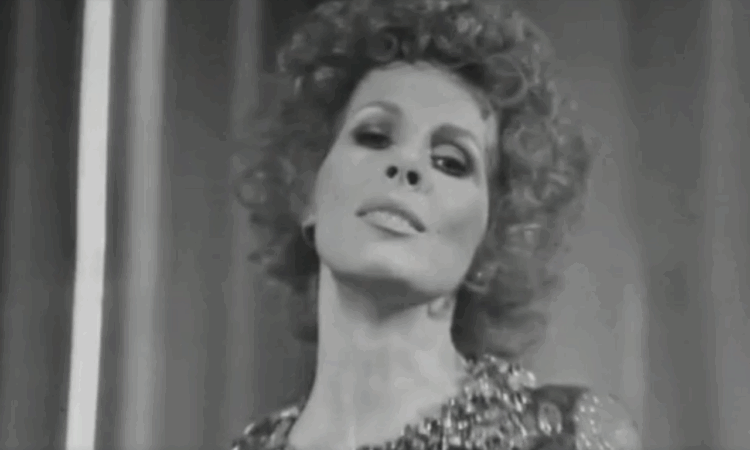The death of Ornella Vanoni leaves a void that goes far beyond Italian music. With her disappears one of the last voices from an era when singers were not merely interpreters but women who narrated themselves, their own desires, their contradictions, their particular way of loving. Vanoni’s sensuality was never engineered to provoke. It was unhurried, elegant, tinged with melancholy, shaped not in reaction to others but in devotion to herself.
She belonged to the same luminous constellation as Mina and Raffaella Carrà: artists profoundly different from one another, yet united by a trait that feels almost revolutionary today. They sang female freedom without waiting for permission. And they did so not as provocation, but as identity.
When Women Sang Their Own Desire
In the Italy of the 1960s and ’70s, sensuality wasn’t a manufactured product. It was self-narration. Carrà invited women to take initiative, and she did it with joy rather than scandal. Patty Pravo transformed transgression into something poetic. Mina embodied an intense, adult femininity, uncontained, unapologetic. Vanoni brought a more intimate tone, slow and confessional, opening a space where a woman could speak quietly and still be unmistakably free.
None of these women performed a fantasy designed elsewhere. They were describing their own. And in doing so, they pushed against a conservative and deeply Catholic society, one that struggled to imagine women with full, complex interior lives.
A Paradox of the Present
Today, the landscape is at once more liberated and more constrained. The female body has never been more visible, circulated across screens, multiplied endlessly. Yet this visibility often leads not to freedom but to standardization. A global aesthetic has emerged, calibrated to a market-driven gaze that transcends borders.
Across contemporary pop, from the United States to South Korea, from Europe to Latin America, certain visual codes repeat themselves. The algorithm favors them. Branding departments refine them. Desire is optimized, exported, replicated. The male gaze has not disappeared; it has been automated.
None of this is an accusation against today’s artists. It is simply the environment in which they must work: a digital ecosystem where creativity often negotiates with virality, where self-invention risks being absorbed into a visual machinery larger than any individual.
A Broken Continuity
Why, then, does it seem that the evolution begun by Carrà, Mina, and Vanoni did not continue in a straight line?
Part of the reason lies in the fragility of that earlier revolution. It was bold but not widespread, carried by a handful of extraordinary women rather than by society as a whole. Their influence was immense, but the structures around them remain, even today, resistant.Another factor is the transformation of media itself.
In the 1970s, television and music programs helped shape a shared cultural imagination. Today, entertainment behaves more like a marketplace: fast, fragmented, dominated by metrics. Sensuality has become a product something that must be consistent, exportable, clickable. Uniformity thrives; difference struggles.
Where Freedom Lives Now
Yet freedom hasn’t vanished; it has simply relocated. The spirit of the 1970s lives most vividly not in the mainstream but at the margins, among queer singer-songwriters, independent performers, experimental voices exploring desire outside the standardized visual lexicon of global pop.
Whether in New York, London, Seoul, São Paulo or Rome, these artists inhabit spaces where strangeness is allowed, and where sensuality can remain an act of self-creation rather than self-marketing. They may not command the mass visibility once enjoyed by Carrà or Mina, but they carry a similar audacity: the courage to make a language of their own desire.
The Lesson of Ornella Vanoni
Vanoni belonged to a time when women had to invent their own sexual freedom, not merely stage it. That made it more complex, more genuine, and more dangerous. Today, freedom exists yet it coexists with a system that standardizes everything, even what we long for.
Perhaps this is her final lesson: that freedom is not something a society grants once and for all, but something each generation must renegotiate. The most dangerous kind of desire is still the one that doesn’t ask to be desired. The freedom Vanoni sang was never a destination. It was a door. And every generation must decide whether to walk through it again.
❤️ Support Florence Daily News
If you liked this article, please consider supporting Florence Daily News.
We are an independent news site, free from paywalls and intrusive ads, committed to providing clear and reliable reporting on Florence and Tuscany for everyone.
Your support — whether a one-time gift or a regular contribution — helps us stay independent and keep telling the stories that matter.
Donate securely via Stripe below.
Make a one-time donation
Make a monthly donation
Make a yearly donation
Choose an amount
Or enter a custom amount
Your contribution is appreciated.
Your contribution is appreciated.
Your contribution is appreciated.
DonateDonate monthlyDonate yearlyEirini Lavrentiadou is an actress and singer, born in Thessaloniki in 1992. She lives in Florence, where she trained at the city’s Theatre Academy and the Fiesole School of Music. She has performed in classical Greek and European plays, worked with international directors and companies, and appeared in concerts ranging from opera to jazz. She contributes to Florence Daily News as a writer.
Discover more from Florence Daily News
Subscribe to get the latest posts sent to your email.

